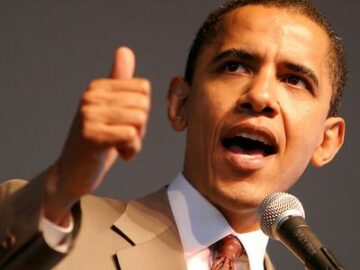Barack Obama inauguration: Two million turn out to greet their new president

The roar of adulation swept across the National Mall and echoed off the granite walls of the Smithsonian museums on each side.
For a day, at least, their mighty collections were eclipsed by the momentous history taking place outside. America finally got its first black president on Tuesday, and the country’s usually staid capital was engulfed in a contagious party spirit.
Two million people covered almost every square foot of Washington’s two-mile grass runway from the Capitol to the Lincoln Memorial to watch the inauguration of Barack Obama – a restless sea of red, white and blue flags that barely stopped waving from freezing dawn to chilly dusk.
Tens of thousands more lined Pennsylvania Avenue, where an armoured black limousine later took the first black American president to his new home – a house built by slaves. Millions, possibly billions, watched on television around the world, but it was the extraordinary numbers who braved the numbing chill of a harsh Washington winter that really spoke best of the Obama appeal.
It didn’t matter that the man the Mall crowds had come to see was, aside from the giant television screens, not even a speck in the distance, separated by a security operation so intense that a police sniper stood on every roof.
Nor did it really matter that, when asked, everyone trotted out precisely the same line about why they had come: “being present at a moment of history” might have been a cliché but that didn’t mean it wasn’t true.
Heeding official advice to get there early, many had arrived while it was still dark with little to protect themselves against the biting cold.
As the sun rose, however, so did their spirits, enlivened by that great American tonic to boredom – shopping. The full glory of US merchandising muscle has been on display over the Obama inauguration and yesterday’s selection, including myriad $2 badges, instant Barack face tattoos and woolly hats inscribed with “Obama” in diamanté lettering, wouldn’t have shamed a major league rock star.
When the rock star finally appeared shortly after midday, the crowd was ready and thousands of digital cameras were raised hopefully into the air and pointed towards the Capitol.
As the swearing-in ceremony finished, the cheering reached a crescendo. Some people simply jumped up and down for several minutes, their faces a picture of ecstasy.
Down in the Mall, it wouldn’t have mattered what he said, the great orator didn’t disappoint when he delivered a predictably emotive, beautifully-phrased address.
There tended to be subdued silence during the long passages, in which the new President spoke of the challenges ahead, enthusiastic cheering whenever he said anything more upbeat and a particularly loud roar when he talked tough about standing up to terrorists.
The Obama celebrations had in fact been going on since the weekend. A succession of galas featuring Hollywood stars and performances by the likes of Sting may have hogged the headlines, but there were dozens more less glamorous functions across the city, many of them inaugural balls for organisations like the Virginia Society for Small, Women and Minority Businesses, which had never had them before.
There was an inescapable sense this year, and particularly in the Mall, that a tranche of American society, especially the young and ethnic minorities, were celebrating a political handover that they might have barely acknowledged in the past.
Those who descended on Washington by plane, train and church bus came in all shapes, colours and economic brackets. Yvonne Wong, a young Australian lawyer, had just got off a flight from South Africa after Washington friends said they had a spare ticket.
“There’s a lot of excitement about him in South Africa. They’re saying he’s America’s Mandela,” she said. “This is so massive. It’s like the world’s on hold today.”
Some had travelled fewer miles to be there but their journey was still more seismic.
Catherine McAdoo, 74, sat out the Obama speech on a bench outside the Natural History Museum, exhausted after having stood in the Mall since before dawn.
She reeled off a list of the Jim Crow law indignities that she remembered from her childhood in Mobile, Alabama – the segregated restaurants, the exam black women had to take to prove they knew how to vote and the buses where they would have to sit in the back after boarding through a separate door.
“I’ve been waiting a long time for this. And, no, I never thought I’d see a black president in my lifetime,” she said.
Mrs McAdoo, a retired teacher, was as much part of America’s “patchwork heritage” mentioned by Mr Obama in his speech as Matthew Wilner, a young white student who had come from New York. He had spent election day this year among the farms of Republican Ohio, campaigning for Mr Obama.
“I came today because I just wanted to be among people who felt the same way as me,” he said.
Ellie Binns had come with a coach load of other Democrat campaigners from Connecticut. “I came here for the Clinton inauguration and you could get right up close but here I am a mile away – that tells you something about his popularity.”
She said her companions had been worried about the bad weather. “I said ‘You don’t have to worry about that with Obama as I think he affects that too’.” Just then, the sun did indeed come out.
